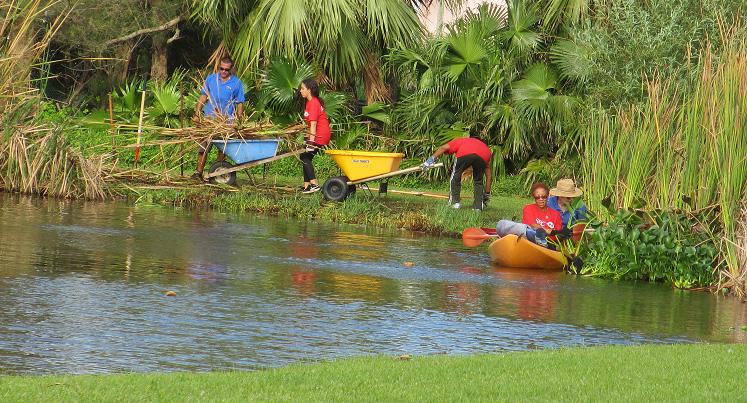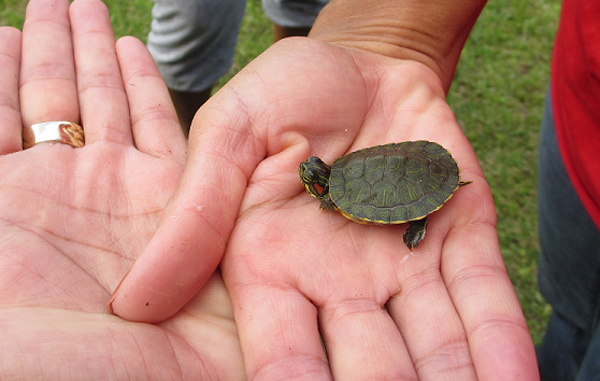BZS: Pond Remediation Project A Huge Success
The Bermuda Zoological Society’s [BZS] Wetlands Remediation Project [WRP], designated the HSBC Global Water Programme for Bermuda in 2014, said they had “great success in its efforts to make two ponds much less toxic for wildlife.”
“These findings are very encouraging since the toxicity of Bermuda’s ponds is a known threat to the island’s two endemic killifish species and its native diamondback terrapins, all locally protected species,” BSZ said.
“The HSBC Water Programme was a five-year, $100 million partnership with Earthwatch, Water Aid and the World Wildlife Fund established to provide a combination of water provision, protection and education, benefiting communities in need, enabling people to prosper, and driving economic development and growth. The Global HSBC Water Programme funded more than 59 water-related projects, with Bermuda being 1 in 35 participating countries.
HSBC Bermuda Volunteers assist the BZS with the remediation of the Cloverdale Pond
“The principal objective of the WRP was to determine if aerating Bermuda pond sediments enabled sediment bacteria to break down poisonous petroleum hydrocarbons to non-toxic levels. The sources of these hydrocarbons, which are found in most of Bermuda’s ponds, include used motor oil, road run-off and vehicle emissions.
“Previously, laboratory studies had shown that these petroleum hydrocarbons [particularly polyaromatic hydrocarbons or PAHs] were responsible for the limb deformities seen in the island’s toads and the severe endocrine disruption [i.e. altered hormone levels] and impaired reproduction observed in Bermuda’s pond fish, toads and terrapins.
“Laboratory studies had also demonstrated that bacteria in the sediments of sampled ponds were deprived of oxygen and therefore not able to efficiently degrade PAHs. However, simply adding oxygen to sediments from these ponds in the laboratory enabled the bacteria to effectively consume the PAHs. These promising results needed to be tested in the field and this effort was made possible by the generous two-year grant from HSBC Group.
“Two ponds were selected for the study, Cloverdale Pond and Evan’s Pond. Cloverdale Pond was the first pond chosen for remediation due to its small size, its known severe effects on wildlife, and the fact that it harboured no protected species in case the process of aeration produced any toxic by-products.
“Evan’s Pond was selected as the second test site due to its threatened small population of genetically unique killifish. The ponds were divided into sections and each section was aerated for 6 to 8 hours a day, using solar powered compressors sending air through weighted air lines to small-bubble distribution manifolds.
Volunteers appreciate the wildlife at Cloverdale Pond
Dr. Jamie Bacon, BZS Research Associate, Education Officer and Principal Investigator for the WRP, explained “It transpired that remediation on each section took approximately a year but by the end of that time, the levels of the 16 PAHs tested were reduced by 96-100% with 100% being a non-detectable level.
“Follow up laboratory studies using samples of remediated sediments from both ponds showed that they no longer caused endocrine disruption or impaired reproduction in fish. This was a fantastic result!”
Dr. Doug Fort, President of Fort Environmental Laboratories in Stillwater, Oklahoma and the project’s chief collaborator, added “The level of remediation accomplished far exceeded that which is typically achieved.
“The ability to reduce contamination to levels that do not adversely affect wildlife in the laboratory combined with presentation of a cleaner environment for humans and wildlife to interact with is a wonderful accomplishment.
“Without the support of HSBC Group, in concert with HSBC Bermuda, the Department of Environment and Natural Resources, the BZS, and the volunteers who participated in the effort, this would not have been possible.”
HSBC Bermuda CEO, Mark Watkinson said, “The Bermuda Zoological Society have demonstrated the importance of preserving our endemic wildlife as well as the adverse effects a compromised habitat can have on thriving eco-systems.
“HSBC is proud to have supported Dr. Bacon and Dr. Fort on this research to identify and reverse the causes of impaired reproduction and deformities on our endemic wildlife. The strength and biodiversity of our eco-systems is a good indicator of our own future health. Projects such as these, enables us to focus on the importance of environmental conservation – for the benefit of Bermuda’s future generations.”
The Bermuda Zoological Society have confirmed the next pond slated for remediation is the South Pond located on the Mid Ocean Golf Course.
They explained that this pond is a main feeding pond for the diamondback terrapins which” have a very poor hatching success rate due to pollution causing deformed embryos.”
The organisation is hoping for equal success rates with this initiative as has been achieved through the HSBC Water Programme remediation projects.
Read More About
Category: All, Environment, News





Wow – well done. Anyone know if any research papers have been planned/published on this project?
This is great news and thank you HSBC for investing in this pilot pond remediation project working with BZS and Dr. Bacon’s team.
Now we can move on to the next pond(s) so we can restore what we have allowed to become toxic through our own behaviour and actions in Bermuda.
Will they publish what specific toxins they found in our ponds and how they treated them?
Do my eyes deceive me or is that a red eared slider in that photo ?
I was thinking the same thing……is it?
They were considered invasive in the past, have they become indigenous now? Why are the pet shops still selling babies then?
We have several papers published. If you are interested in electronic copies, please contact me at edofficer.bzs@gov.bm.
Great news! Any chance of seeing this branch over in to Spittal Pond?
Such great news! Glad to see that enough people care for Bermuda’s environment to make a difference!
Fantastic work! Now let’s get on with creating government incentives for citizens and long term residents to purchase renewable energy systems (wind, solar etc …) for their homes and businesses. Also, let’s introduce a timeline for the purchase of electric cars, buses and motorcycles on this island. Sustainability and healthy environments are crucial for all living things!